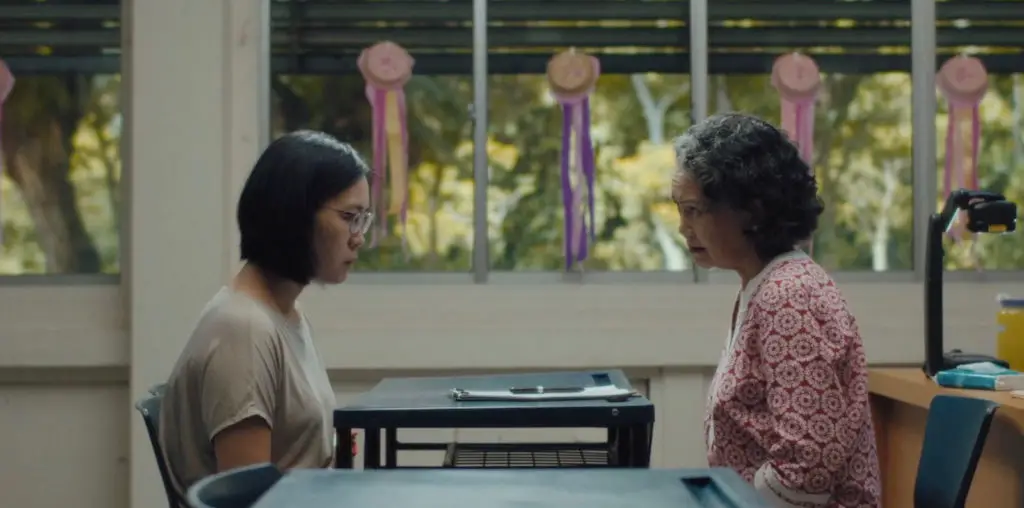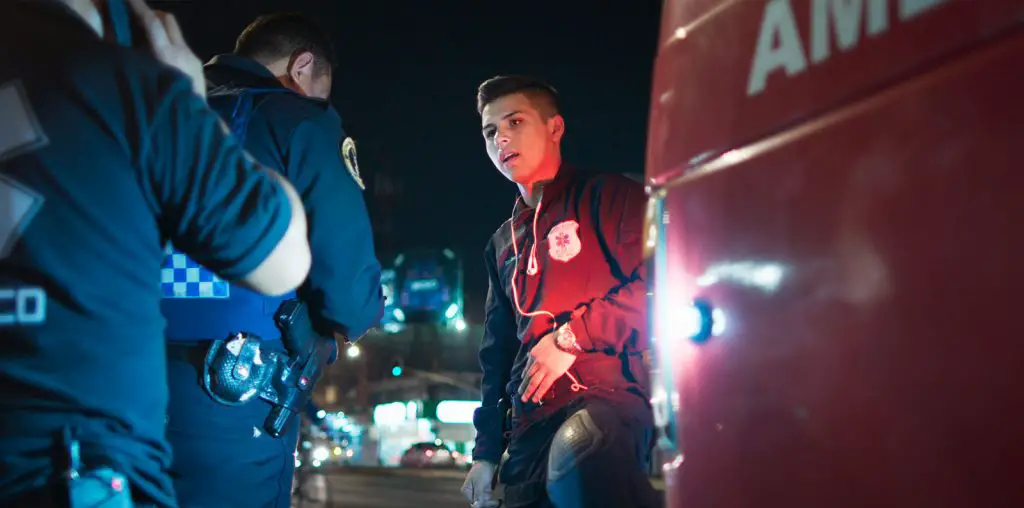
You made two films in London. What is the filmmaking scene like in London compared to New York or Hollywood? ^ I found there to be greater knowledge about worldwide cinema, maybe because it can be so hard to see foreign cinema in the U.S. In a lot of European countries, you can turn on a television set that doesn’t have cable and find “All the Vermeers in New York” or something equally interesting playing. That said, some of the stuff made over there is atrocious. I had a roommate who’s an actor, and he would show me things that he was auditioning for. The scripts would sometimes be beyond awful, worse than the most terrible American sitcoms. ^ I got the sense that in London and some other European countries that there’s not the access to private money that we have here, nor can you max out a lot of credit cards. So fewer people have the chance to direct. The people that I knew tended not to dream of becoming a titan who makes $500 million because it isn’t possible unless you come to America. Friends of mine who were filmmakers would go see the new studio films so they could see what toys were being used, but it was stuff that I think they suspected that they’d never get their hands on. ^ I always made my films super cheaply. They’d be silent or have non-sync sound, and we used old World War II-era Arris. I edited on Moviolas and Steenbecks, which I’m grateful for having done. I’d use whatever locations I could get for free, and whoever wasn’t doing anything that day would be my crew. My first film, “Love and Lung Cancer,” starred Neve McIntosh, who is now a famous actress in the U.K. There are even creepy Internet sites devoted to her. I guess that’s the surest sign of success.
One of your London films, “Brno Train Death Friend,” featured a song that Moby donated for the soundtrack. How did this generous gift come about? ^ Quite simply. I wanted to use “God Moving Over the Face of the Waters” as the music for the film, so I contacted either his London management team or record label (I don’t remember which). I e-mailed them the script, and about two weeks later I got an approval for festival-only rights. I never met Moby or spoke to him, though the woman I dealt with said that he read the script and liked it. When I completed the film I sent him a video copy, but I never heard anything back so I assume that he either hated it or never saw it.
Your new film is “A Sense of Entitlement.” What was the genesis of this project? ^ I was walking home from the video store one night when I was living in London. At the time, I had a flatshare in this enormous loft in the heart of Soho. Suddenly I was struck by the thought that was 25, had no responsibilities, and was living abroad. And I realized how fortunate I was at that moment. That led to the notion of what I would do if the bottom dropped out and I went from being lucky to unlucky in an instant. ^ I also had this roommate who was kind of a “hound of love,” and whenever he was trying to seduce someone he would invite them over to watch “Breakfast at Tiffany’s.” And he’d always welcome me to watch with them if I happened to come home at that time. I must’ve seen that film about 15 times or so over the course of a few months. I got to know it quite well and really liked it, although I wondered what it would’ve been like if they’d come right out and called Holly Golightly a hooker. ^ “A Sense of Entitlement,” to me, plays a lot like a less sunny version of “Breakfast at Tiffany’s” even though it’s not any sort of remake and bears no direct resemblance. My original version of the script was more comedic, and had a Keystone Kops ending that was later scrapped in favor of this one. The difficulties of making the transition from comedy to drama are apparent, I think, in the abruptness of the father’s leaving Jessica’s apartment so quickly. Originally he was supposed to be crushed by a falling anvil or something dopey. ^ I told a friend who living in Paris what I wanted do, and she said that if I made it there that she’d produce it. Elements from that plan remain, like one of the main characters being French. After I decided to shoot in New York, I added in Caroline’s rendezvous with the two sleazy stockbrokers because New York was so different from when I had left. Suddenly, all anybody could think about was the stock market and it seemed ridiculous. I used to hope for a recession, because then maybe people might get a grip and re-examine themselves a bit. That’s there in “A Sense of Entitlement”: the best thing that can happen to Caroline is that suddenly she’s alone, without any skills or support, and she has to find her own way. That’s where we leave her. I never bothered to think about what happens to her after the film ends, because I don’t think it matters.
Most short films never get seen by wide audiences, but “A Sense of Entitlement” is the rare short film to snag a theatrical playdate. What incentive is there for the creation of short films if the overwhelming majority is never going to be seen? ^ The possibility that it might be seen is a pretty huge lure and it made me want to take that chance, although it wasn’t my driving force. I made this film with the hope that it would lead to others, but the main reason I did it was because I thought that it would make an excellent movie. It would either get into festivals and theaters or it wouldn’t. I figured that if I made films for myself, then hopefully an audience would appreciate what I was doing. They’d find me. Maybe that sounds egotistical, but I figure that making films is difficult enough without trying to please a lot of people that I don’t know. This way, at least I’ll either succeed or fail on my own merits.
Tell us about your new project, “The Last Time I Saw Manhattan.” ^ It’s something that I’m really excited about, because it’s going to be a huge change of direction from “A Sense of Entitlement.” It’s going to be vibrant but scruffy and, I hope, full of a kind of sly charm. It’s to be a short feature (or maybe longer, depending upon how things turn out) shot in different formats: 35mm, DV, Pixelvision, and Super-8mm. It has a semblance of a narrative, though it’s somewhere between having one and not. I’ve been describing it as having the buoyancy and spirit of a musical without any dance or music. It’s a comedy about two people who decide to have a love affair devoid of anything to do with commerce or capitalism. And it makes everyone around them very, very uncomfortable. ^ Right now, I’m trying to raise the funding. It’s been a strange process. Many people that I respect greatly have read the script, loved it, and then passed on financing it because it’s extremely hard to raise money for projects of this nature. Even though nobody’s “bitten” yet, I’ve had 15 minute telephone conversations where people have gushed about the script after they’ve said “no.” So I know that I’m on the right track. I need to find a person or organization willing to back something like this. The key creative people are already on board: DP, composers, and so on. All I need is the sugar daddy.
Finally, what suggestions can you offer to aspiring cinemaniacs interested in working in the film industry or trying to get published as film critics? ^ If you’re asking me for advice, you’re probably not that bright.
Learn more by visiting Mark L. Feinsod’s official web site.
Check out FILMTHREAT.com’s INTERVIEW ARCHIVES and read hundreds of fascinating in-depth interviews with directors, filmmakers, actors and celebrities from the world of film!

